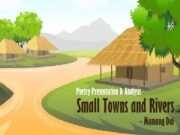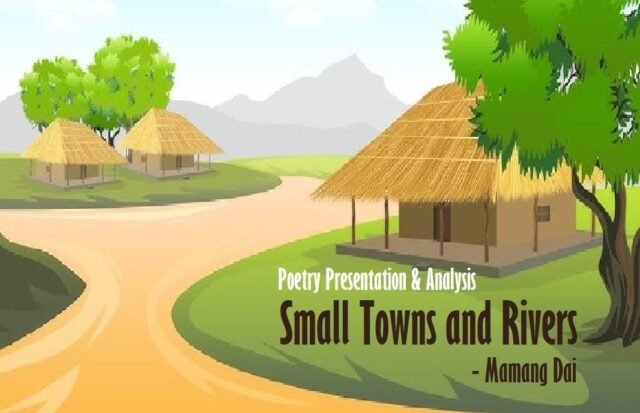Poem: ‘Small Towns and Rivers’
– Mamang Dai

About Poet:
- Mamang Dai (born 1957) is a poet, novelist, journalist and former civil servant from Itanagar; Arunachal Pradesh
- She writes in English as well as Adi language.
- She is also an active radio and TV journalist covering news programmes and interviews for All India Radio and Doordarshan, Itanagar.
- She was a programme officer with World Wide Fund for Nature and worked with Biodiversity Hotspot Conservation Programme.
- She has received Padmashree Award in 2011 and ‘Sahitya Akademi’ Award in 2017.
- Mamang Dai is a strong voice from the North East, a writer and a poet par excellence whose work has the fragrance of her land and her people.
About Poem:
- The poem, Small Towns and Rivers is taken from the collection of the poems, ‘The River Poems’, published in 2004.
- The poem describes a landscape and Nature where river is a dominant phenomenon.
- Through the concepts like ‘river has a soul’ and ‘river knows immortality of water,’ the poet makes us aware of the lively nature around her hometown ‘Pasighat’ and the eternity of the natural elements.
- She finds that even life and death are transient.
- The poem is based on the belief of the tribal people from the North East, that the souls of the beloved ones always continue to dwell in the natural elements around. So she remembers death when she sees the towns.
- The towns, she implies, have prospered when Nature has been destroyed. The poet has expressed anxiety at the developments in the small towns.
 Small towns always remind me of death.
Small towns always remind me of death.
My hometown lies calmly amidst the trees,
it is always the same,
in summer or winter,
with the dust flying,
or the wind howling down the gorge.
Just the other day someone died.
In the dreadful silence we wept
looking at the sad wreath of tuberoses.
Life and death, life and death,
only the rituals are permanent.
The river has a soul.
In the summer it cuts through the land
like a torrent of grief. Sometimes,
sometimes, I think it holds its breath
seeking a land of fish and stars
The river has a soul.
It knows, stretching past the town,
from the first drop of rain to dry earth
and mist on the mountaintops,
the river knows
the immortality of water.
A shrine of happy pictures
marks the days of childhood.
Small towns grow with anxiety
for the future.
The dead are placed pointing west.
When the soul rises
it will walk into the golden east,
into the house of the sun.
In the cool bamboo,
restored in sunlight,
life matters, like this.
In small towns by the river
we all want to walk with the gods.

Themes:
The poem contains some important themes such as mortality, life vs death, eternity, nature, and spirituality. The theme of mortality haunts the poet the most. Through the symbol of “small towns”, the poet introduces this theme. Moreover, the theme of ‘life vs death’ is integral to the poetic reflection on mortality.

| Personification | ‘The river has a soul’ ‘I think it holds its breath’ |
| Simile | ‘Like a torrent of grief’ |
| Inversion | ‘In the dreadful silence we wept’ |
| Antithesis | ‘Life and death, life and death’ ‘In summer or winter’ |
| Repetition | ‘Life and death, life and death’ ‘Sometimes, sometimes, I think it holds its breath’ |
| Transferred Epithet |
‘Looking at the sad wreath of tuberoses’ ‘In the dreadful silence we wept’ |
| Metaphor | ‘A torrent of grief’ |
 Poetic Appreciation:
Poetic Appreciation:
| About Poem, Poet and Title |
‘Small Towns and Rivers’. Taken from the collection ‘The River Poems’. Indian poetess Mamang Dai. |
| The theme | Description of poet’s hometown ‘Pasighat’. Need to preserve the natural beauty. ‘Life and death’. ‘Mortality and Eternity’. |
| Poetic style | Free verse. Consisting of seven stanzas. The river symbolically depicts nature and its permanence. |
| Language and Poetic Devices |
Simple and creative language is used to depict the beauty of nature. Use of Metaphor, Simile, Antithesis, Repetition and Personification. |
| Special features | The poem is based on the beliefs and ideology of the tribal people from North East India. Various natural elements are skillfully mentioned in the poem. |
| Message, Value, Morals |
We should protect nature and its elements. It is our responsibility to preserve and tend to the world in which we all live. |
| Own opinion | I think, the poem presents a contrast between the mortal humans and the immortal nature. |

The importance of Nature in the lives of the people from the Northeastern part of India as expressed in the poem with reference to Flowers, River, Bamboo and East:
a. Flowers: Tuberoses, which are used into wreaths or garlands are referred in the poem to symbolize our Love and Memory towards a dead person.
b. River: The ‘river’, referred in the poem shows our respect and worship towards nature. The river has a soul and its water is immortal and eternal.
c. Bamboo: ‘Bamboo’ is referred as a natural element in the poem. It is restored in sunlight and it keeps us cool and gives us a life with comfort.
d. East: ‘East’ is the direction which is referred as golden and a dwelling place of the sun.

Lines that describe the poet’s small town ‘Pasighat’ in Arunachal Pradesh:
- My hometown lies calmly amidst the trees,
- It is always the same, in summer or winter, with the dust flying
- It knows, stretching past the town
- A shrine of happy pictures marks the days of childhood
- Small towns grow with anxiety for the future
- In small towns by the river we all want to walk with the gods

List of Natural Elements mentioned in the poem:
| Wind | Trees | Dust |
| Gorge | Mist | Tuberoses |
| Fish | Stars | Torrent |
| Water | Earth | Sun |
| Bamboo | Mountaintops | River |

“The river has a soul.” Elaborate the concept in your words as the poet has explained in the poem:
- In the context of the poem “Small Towns and River,” the line “the river has a soul” suggests that the river is described as having a spiritual or living essence.
- Instead of being seen merely as a body of water, the poet attributes a deeper, more meaningful quality to the river.
- This line implies that the river is not just a physical entity but possesses some sort of inner, intangible essence that might connect with the emotions or experiences expressed in the poem.

The relevant lines from the poem which reveal that the poet is convinced with the immortality of water:
- ‘and mist on the mountaintops’
- ‘from the first drop of rain to dry earth’
- ‘the river knows the immortality of water’

Measures to take to convince the people regarding the need to conserve the Nature:
Convincing people about the need to conserve nature is crucial for the well-being of our planet. Here are some simple measures you can take:
- Tell stories about the beauty of nature and its importance in our lives.
- Use simple examples to make people connect emotionally with nature.
- Emphasize the direct benefits of a healthy environment, such as clean air, water, and a stable climate.
- Explain how nature supports our well-being and provides resources for our daily needs.
- Illustrate the negative impacts of environmental degradation, like pollution and deforestation.
- Help people understand that our actions today affect the quality of life for future generations.
- Highlight the connection between a healthy environment and personal health.
- Utilize images and videos that showcase the beauty of nature and the negative effects of environmental damage.
- Encourage community participation in tree planting, clean-up events, or other eco-friendly activities to foster a sense of shared responsibility.
- Explain the concept of biodiversity and how each species plays a role in maintaining a balanced ecosystem.
- Help people understand that preserving different species is essential for the overall health of the planet.

Match column ‘A’ with column ‘B’:
| Column A | Column B |
| 1. Cool | i. Silence |
| 2. Happy | ii. Towns |
| 3. Dreadful | iii. Dust |
| 4. Dry | iv. Hometown |
| 5. Small | v. Bamboo |
| 6. Flying | vi. Earth |
| 7. Calm | vii. Rituals |
| 8. Golden | viii. Water |
| 9. Permanent | ix. Pictures |
| 10. Immortal | x. East |
(Answers: 1-v, 2-ix, 3-i, 4-vi, 5-ii, 6-iii, 7-iv, 8-x, 9-vii, 10-viii)

Compose 4 to 8 lines on ‘Gift of the Seasons’:
In spring, a bloom of flowers bright,
Nature’s gift, a pure delight.
Summer brings warmth, skies so blue,
Golden days, a dream come true.
Autumn paints with hues so grand,
Leaves like gifts from nature’s hand.
Winter whispers, snowflakes play,
A blanket white, a gift each day.

Write a dialogue between two friends on the topic- ‘Importance of the Rivers’:
Manoj: Hey there! I was just reading about the importance of rivers in our geography class. It’s pretty fascinating stuff.
Anand: Oh, really? Rivers? What’s so interesting about them?
Manoj: Well, think about it. Rivers play a crucial role in our ecosystem. They’re like the lifelines of our planet.
Anand: Hmm, how so?
Manoj: They provide water for all kinds of plants and animals. It’s like a giant watering system for the Earth.
Anand: True, hadn’t thought about it that way. What else?
Manoj: They also help in maintaining the balance of different ecosystems. For example, the water from rivers flows into oceans, regulating the salinity levels.
Anand: So, it’s not just about fresh water then?
Manoj: Exactly! Rivers are like nature’s distribution system. They transport nutrients and sediments from one place to another, enriching the soil along the way.
Anand: Wow, I never realized they did so much. What about us humans?
Manoj: Well, we benefit a lot too. Rivers are a source of drinking water for many communities. They also support agriculture by providing water for irrigation.
Anand: That makes sense. Any other cool facts?
Manoj: Yeah! Rivers are like natural highways. Historically, they’ve been crucial for transportation and trade.
Anand: I never really thought about it, but you’re right. Rivers are pretty awesome.
Manoj: Totally! So, next time you see a river, just remember, it’s not just flowing water – it’s a vital part of our planet’s ecosystem.
Anand: Manoj, thanks for everything you told today.

Personal Response: Most of the civilizations have flourished on the banks of the rivers. Give reasons:
- Availability of water
- Fertile Soil
- Energy Source
- Trade and Commerce
- Transportation
- Fisheries
- Climate Moderation
- Urban Development etc.

also see:
| ONLINE GRAMMAR QUIZZES with CERTIFICATES |
| ENGLISH GRAMMAR_1 |
| ENGLISH GRAMMAR_2 |
| GRAMMAR: SPOT THE ERROR |
| USEFUL EXPRESSIONS IN ENGLISH SPEAKING |
| WORD FORMATION PROCESSES |
| PHONETICS |







































